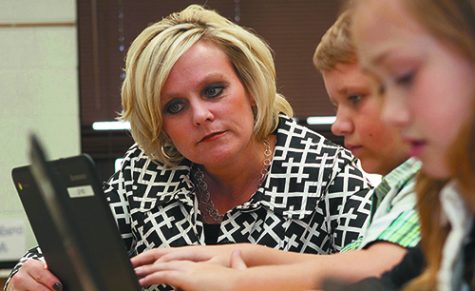An Unsettled Future for Education
![Governor-Elect Eric Holcomb will assume office Jan. 11, 2017. His stated educational plans include “giv[ing] parents the freedom to choose in which school their child can best learn.](https://millermedianow.org/wp-content/uploads/2016/12/eric_holcombpage10Finished.jpg)
Photo by Photo provided by holcombforindiana.com
Governor-Elect Eric Holcomb will assume office Jan. 11, 2017. His stated educational plans include “giv[ing] parents the freedom to choose in which school their child can best learn.
January 13, 2016
Political issues involving education punched their way to the forefront of this fall’s election, both nationally and in Indiana. And many campaign watchers are expressing concern about issues such as the potential privatization of public schools and possible changes in school funding.
One group of education researchers in Indiana worries that educational controversies like these are flying unnoticed under the radar, leaving politicians with a chance to make changes that these observers feel will not benefit the group who will be affected the most: students.
“There has been no worthwhile resistance,” Douglas Martin said. Martin is the author of Hoosier School Heist, a book about the reformation of education in Indiana and how Martin feels billionaire education experts are placing greed above the common good.
In Martin’s view, corporations that seek the privatization of schools in order to profit from taxpayers money are seriously threatening the existence of public schools.
“Extremely wealthy people,” Martin said, “many who do not even live in Indiana, are calling the shots.”
Researchers like Martin believe that public schools are being victimized, especially through school vouchers. Vouchers are government-funded tuition payments that can be used at a private school or a school that can not be freely attended.
Indiana Governor-Elect Eric Holcomb and incoming Superintendent of Public Instruction Jennifer McCormick, the two most important voices in Hoosier education policy, have both expressed support for vouchers and for the ability of parents to choose what kind of school their children attend.
During the campaign, Holcomb, a Republican, focused much of his attention on reforming ISTEP and improving schools with consistently low test scores. But Holcomb also emphasized parental choice in the way their child is educated.
“Here at home, we have seen in practice, not in theory, what happens when we honestly balance budgets, cut taxes, create a savings account for rainy days, build roads and bridges and give parents the freedom to choose in which school their child can best learn,” Holcomb told the Kokomo Tribune.
Martin feels that the freedom that vouchers promise comes at too high of a price.
“The problem with school vouchers is they are part of a much bigger agenda which desires to completely privatize education by disrupting the public school structure in as many ways as possible,” Martin said.
Although she claims to be in favor of school-choice, McCormick, also a Republican, said during the election that she is unwilling to pursue policies that would divert money from public schools.
McCormick did not respond to the Mill Stream’s request for comment on this story.
However, she told the Indianapolis Star during the fall campaign, “I’m not a political person. I am an educator.”
In her campaign, McCormick expressed more support for a privatized school system than her opponent, Democrat and current Superintendent of Public Instruction Glenda Ritz.
Even though the two have their disagreements on issues like vouchers, Ritz and McCormick have both expressed in the fall campaign a desire to help low-income children. And Holcomb has said as well that his new administration is going to direct its attention to needy Hoosier students.
McCormick campaigned on the issue of schools receiving report cards that use alternatives to the state’s current A-F grading scale that examines standardized testing, community involvement and academic growth.
But in the fall election, the issue of school vouchers fought its way into the light above most other issues.
“Indiana now has one of the largest voucher programs in the country with 32,686 kids across the state—nearly 3 percent of Indiana students—potentially getting thousands of dollars a year from taxpayers to spend on private school tuition,” according to education reporter Shaina Cavazos of Chalkbeat.
Martin says that this issue is one that will directly affect the education NHS students may receive in the future. Those students who think the election will not affect them may be surprised at how their classroom might change.
“What is needed more now than ever is a school system which teaches critical thinking, empathy, environmental awareness and respect, a school system that teaches the younger generation to love people over profits,” Martin said. “These, unfortunately, are not cherished traits now, and they will be completely off the radar in the school of the future.”

Superintendent of Public Instruction-Elect Jennifer
McCormick defeated Glenda Ritz in the Nov. 8 election. “I’m not
a political person. I am an educator,” McCormick said.


